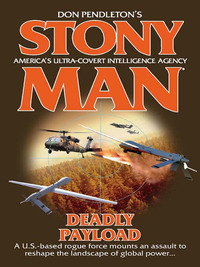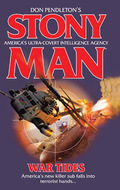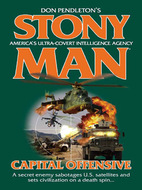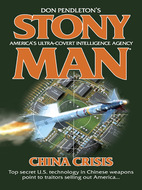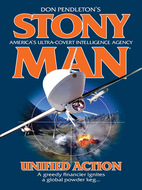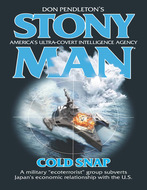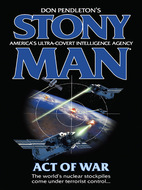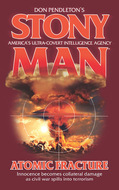Czytaj książkę: «Deadly Payload»
Deadly Payload
DON PENDLETON’S
Stony Man® AMERICA'S ULTRA-COVERT INTELLIGENCE AGENCY
Special thanks and acknowledgment to
Douglas P. Wojtowicz for his contribution to this work.
CONTENTS
PROLOGUE
CHAPTER ONE
CHAPTER TWO
CHAPTER THREE
CHAPTER FOUR
CHAPTER FIVE
CHAPTER SIX
CHAPTER SEVEN
CHAPTER EIGHT
CHAPTER NINE
CHAPTER TEN
CHAPTER ELEVEN
CHAPTER TWELVE
CHAPTER THIRTEEN
CHAPTER FOURTEEN
CHAPTER FIFTEEN
CHAPTER SIXTEEN
CHAPTER SEVENTEEN
CHAPTER EIGHTEEN
CHAPTER NINETEEN
CHAPTER TWENTY
CHAPTER TWENTY-ONE
CHAPTER TWENTY-TWO
CHAPTER TWENTY-THREE
EPILOGUE
PROLOGUE
Jason Kovak ran his fingertips across the smooth shell of the unmanned aircraft, a smile coming unbidden to his lips. It was a simple machine, with a standard propeller engine mounted under a housing that protected it from detection by thermal imagers. Even so, it ran much more coolly than a rocket thruster. The powerful computer in its bulbous nose would steer according to data flowing from its forward-looking radar, avoiding collision with terrain. That was only on autopilot, while utilizing an artificial intelligence program. Inside the sloped head there was also a tight beam transceiver, capable of picking up signals from a thousand miles away to be directed by remote control. Riding beneath wing mounts on two hard points were six high-powered missiles, their noses fitted with television cameras for precision fire.
“How many do we have?” the Israeli asked.
“Enough for what you wish,” Cortez answered. His handsome, tanned features and black, silken suit reminded Kovak of an unmasked Zorro.
Kovak nodded. “We’ll need quite a few. With some optional payloads. You’re sure you can get enough?”
“Generosity, promises whispered,” the Argentinian said, stroking his neatly trimmed pencil mustache. “I have my means.”
Kovak nodded. “I won’t dig too deeply, then.”
“This is a big step for your side,” Cortez said.
“My side?” Kovak asked. “I don’t have a side anymore. Not after we’ve been betrayed.”
“And so you’re turning to us,” the Argentinian concluded. “You can’t get much more anti-Israel than our consortium.”
“Israel and the Arab nations are partners now,” Kovak said. “Bedfellows, seeking out peace accords when for millennia they’ve assailed the land promised to our people. They forget the Holocaust. It was a blip in history, done by a German madman long dead.”
“So you’re going to destroy your country?” Cortez asked. “Not that we mind. After all, Mossad’s been hunting the Consortium’s family and membership for decades.”
Kovak chuckled. “There’s a little sting, I’ll admit. But the Mossad is a joke, knuckling to political correctness and cowardice. The Consortium isn’t on an anti-Jew kick now, because it has other problems. Both of us have other things to worry about. Betrayals, weakness and weakened, corrupted leadership that needs a slap in the face to wake up. We have the same goal. We are one, building a better future.”
Cortez nodded and held out his hand to the Israeli. “A world without our different headaches.”
“Engineering the new tomorrow,” Kovak said, referring to the name of the alliance. “If anyone wishes to stop us, they’ll run face-first into a united front.”
T HE FIRST STRIKE of the united front known only to a few as the Engineers of the New Tomorrow came at dawn at a terrorist camp just five miles north of Damascus, Syria, in the mountains that formed a natural border with Lebanon. The camp was used by Syria to train and arm members of the Popular Front for the Righteous Liberation of Lebanon, a splintered offshoot of the Palestinian forces in the Lebanese countryside.
The strike was preceded only instants before by the soft hum of propeller-driven unmanned aerial vehicles, which drew the attention of the sleepy camp guard. The guards were used to being buzzed and observed by the Americans with their Predator drones, but every so often the Pentagon wanted to look as if it was taking a more offensive stance, and dropped a couple Maverick missiles into their backyard. Nothing that would obliterate the widely dispersed camp. Still, the groggy guard called out a warning, but by the time the words left his mouth, it was too late.
The first three rounds were white phosphorous, which burst thirty yards above the ground. They had been perfectly spaced and timed, clawing trails of burning waxy smoke spreading wide and arcing down into the unprepared camp. Half-dressed men, hearing the cries of alarm from the sentries, had burst from their tents and run right into the searing rain. As the WP struck their flesh, whether or not it was exposed or protected by clothing, it melted through, destroying skin and muscle until it burrowed down to the bone.
The lucky ones passed out immediately, while dozens of others ran screaming in horror at a pain that could only be torn out on the point of a knife. Lebanese insurgents and Syrian advisers twisted and writhed, grinding into the muddy ground, trying to drown the burning fragments of white phosphorous, but once exposed to air, the deadly element was unquenchable. Flesh around the fragments cooked and peeled away from bone in a slow, murderous torture.
The second wave of missiles from the UAV drones came unheard, the screams of the wounded and dying filling the air until the shrill rattle of 77 mm artillery rockets was right on them. These landed amid the semipermanent prefabricated buildings where supplies were stored. Thermobaric warheads struck with earth-shattering force, ripping Quonset huts to pieces and destroying anything and anyone still inside. Assault rifles and rocket launchers meant to slay the enemies of Syria in Lebanon were turned to pulped and mangled piles of wreckage.
A lone round sizzled into the communications hut and scoured it from existence with a blast equal to six sticks of dynamite. A radioman inside was cut off in midrequest, begging for help and support from the Syrian military when he and the hut were blasted into oblivion. The largest piece remaining of the Syrian communications officer was the size of a pencil eraser.
As smoke roiled into the sky, the circling drones whirled into position to launch phase three. Like hightech vultures, the quartet of drones pumped out a sheet of staggered rockets. It would have seemed overkill had it been conventional explosives or white phosphorous, but instead, cakey yellow clouds erupted from each artillery rocket strike. The ugly ocher fog spread across the camp. The cries of the wounded suddenly fell silent as the cloud washed over them.
One rocket round had landed, unexploded, its fuse apparently having malfunctioned. While the manufacture was undeniably American, the writing on the side was Arabic. The unmanned drones themselves were identical to the machines given to Egypt by the United States government as part of a multibillion-dollar lend-lease agreement.
Syria, stung with betrayal over the loss of dozens of its troops to an Egyptian sneak attack, threw out accusations, crying out in hatred against politicians in Cairo and Washington, D.C., vowing revenge.
Shock waves rippled across the globe.
P HASE TWO OCCURRED within thirty minutes of the attack in Syria, but it occurred in Panama. Memories of the invasion that had deposed Manuel Noriega decades earlier had never really left the public’s mind. The full might of the United States armed forces had crushed down and taken out Noriega’s government and forces. The American liberal elite had accused the Reagan administration of using overkill against the Panamanians, to the point where AC-130 gunships were said to have slaughtered citizens and soldiers alike as they raked neighborhoods with dozens of machine guns and cannon in synchronized fire.
Those wounds were yet fresh and raw, despite the long years since 1989. The United States consulate still had its share of protesters out front, anger sharp and focused over lost loved ones. They were peaceful, and they carried candles for a midnight vigil commemorating the anniversary of the invasion. Mournful hymns in Spanish hung in the air as the protesters said goodbye to loved ones once more and called upon God for justice in an unjust world.
The Marines at the front gate had grown used to this, and relaxed only a little. Policy had been to keep their rifles cold at all times, but the warrior elite knew better. Cold weapons in Beirut had cost 249 brothers their lives, and even though the Panamanians were armed with nothing more dangerous than candles, there were enough of them that the guards had their M-16 A 4s hot and ready.
Somewhere behind them, a weapon opened up, and the armed Marines whirled at the sound. It took only a few moments for them to recognize the roar and chatter of an M-240 medium machine gun—standard Marine and Army issue, as well as being hugely popular throughout Europe. It could burn off 7.62 mm rounds at 850 rounds per minute, and was deadly out to a thousand yards. The Marines crouched, believing themselves to be under attack, but the haunting hymns had been turned to screeches, a horrifying wail, as if someone had dragged a needle off one track and let it go on a recording of hell itself.
The Marine guards whirled and saw unarmed civilians twist and thrash as 7.62 mm NATO rounds chopped brutally into them. Bodies collapsed and screams of panic filled the air. By the time the Marines realized what was going on, the unmanned drones swung over their heads, brass raining from their belly-mounted machine guns. The two, sleek UAV craft climbed to swing around for another strafing run. The embassy protectors took shots at the airborne marauders. However, the killer drones had climbed out of the effective range of their M-16s.
The aerial predators whirled and sliced down again, streams of high-powered lead erupting from their gun pods and ripping into the helpless crowd.
Marine Sergeant Zachary Admunsen pulled out his equalizer—an AT-4 antitank rocket. Hitting an aerial craft would be difficult, but Admunsen wouldn’t let civilians die without an effort. He triggered the rocket, giving one of the two drones some lead time. The warhead connected with the high-tech aircraft and blew it in two. The tail end whirled like a dervish and chopped off the right wing of the second Predator. It speared forward and crashed, relatively harmlessly, into the roof of the U.S. consulate, bursting apart into splinters. The semidisposable drones hadn’t been intended to survive heavy ground resistance, but being unmanned, their loss was only a small monetary setback, not the life of a skilled pilot.
Still, Admunsen was stunned to see that he’d taken out both attackers with a single shot.
By then, though, it was too late. The damage had been done and the throng of protesters had been dispersed. Corpses littered the ground, forty-seven dead and another dozen wounded. Most had been victims of gunfire, but others had been trampled in the mad flight to get out of the machine gun’s thunderous scythe of lead and fire.
Once more, accusations flew.
CHAPTER ONE
“So why are we investigating the destruction of a terrorist camp in Syria again?” T.J. Hawkins whispered to Calvin James as the Zodiac boat hummed toward the Lebanese coast. “If you ask me—”
“Well, I didn’t,” James retorted.
“Well, if you did, whoever took them out did us a favor,” Hawkins answered.
“Really, mate?” David McCarter asked as he scanned the shore with his field glasses. “A chemical weapons attack on an unfriendly country, using American materials. That’s a favor to the U.S.? I’d hate to see what you’d call a slap in the face.”
“The PFRLL were some of the sickest bastards in the Lebanese equation, though,” Hawkins stated. “They never cared about civilian casualties when they made their attacks. It’d have been our job, sooner or later, to take them out.”
“Sooner or later, sure,” Rafael Encizo answered as he worked the rudder’s till, keeping them on course despite a crosscurrent. “But then, we also need to figure out who has a small automated air force. The drones responsible for the attack could end up in the hands of someone who might turn them against a city.”
“Well then, that’d be a whole new mess o’ pig shit,” Hawkins admitted.
Encizo nodded, returning his attention to guiding the inflatable raft. The muscular little Cuban’s steady steering was born of years spent by the sea, either diving or working boats. Between him and Calvin James, Phoenix Force had the training to handle almost anything on the water. The inflatable raft would be collapsed on the shore and buried before they went inland. If necessary, the raft could be dug up and used to exfiltrate from the country, but McCarter had other avenues out of Lebanon, just in case the investigation took them on a new path.
“Welcoming party,” Gary Manning announced as he spied the beach through the scope of his Heckler & Koch PSG-1 rifle.
Hawkins’s hand tightened on the grip of his G-36, but his trigger finger rested on the receiver.
“Keep your booger hook off the bang switch,” he remembered his drill instructor bellowing in basic training. It was second nature for the Southerner, by now. Even as a Ranger, he practiced as a professional, not until he got it right once, but until he never got it wrong. That mentality was pushed even further as a veteran member of Phoenix Force, one of the most elite combat units in the world. The five handpicked Stony Man warriors had been chosen for their experience and ability. All of them were highly trained commandos.
“They spot us yet?” McCarter asked Manning.
“No. They seem to be waiting for someone else,” Manning said. “Their attention is more to the north.”
McCarter drew his finger across his throat and the Stony Man commandos fell silent. Only the muffled Mercury engine made any sound, and even then, it was a soft hum that was easily swallowed by the lap of waves. Phoenix Force lowered its profile, lying in the bottom of the raft, only Encizo and Manning breaching the tops of the inflated Kevlar pontoons to steer and to observe the mysterious group on the shore.
McCarter pointed to James and patted the grip of his knife. He nodded to Encizo. The stocky Cuban flicked a thumbs-up to the fox-faced Briton and adjusted their course a little farther to the south.
So much for the plan of burying the raft, Hawkins mused. With unknown forces on the shore, they would have to scuttle the inflatable raft, slashing through the rigid nylon pontoons. The weight of the motor would drag it down, and Phoenix Force would swim a hundred yards to shore.
Hawkins fed Encizo’s rifle into a water-tight bag, since he was steering. He did the same for Manning’s PSG-1, while the powerfully built Canadian switched to McCarter’s field glasses to maintain surveillance of the unknown enemy.
“There,” Encizo stated softly. He turned off the engine and James slashed the inflated tubes to starboard while McCarter took out the port side. The raft collapsed almost instantly, Mediterranean seawater rushing in and engulfing Hawkins. Within a few kicks, Phoenix Force had swum free of the sinking raft, and Hawkins handed Encizo and Manning their waterproof packs.
So far, their plans had been preempted, but then, an average day of work for Phoenix Force rarely went as they hoped. However, the team had been formed to take care of things when nothing had gone right. Adapt and overcome was their forte.
H ERMANN “G ADGETS ” S CHWARZ was no stranger to Central America, and he was no stranger to the morass of its constant threats and violence. Going over the files that described the evidence of the Panama assault, he tried to gain the measure of who they were up against this time out. In the past, the warriors of Stony Man Farm had battled all manner of threats in the canal nation, from renegade secret policemen who killed for their fascist beliefs to Chinese espionage agents trying to gain control of the canal to drug dealers who had flourished under the former dictator. Often, multiple parties entwined, and even forces theoretically on the same side, like Communist rebels and the Red Chinese government, were at odds against each other. Then again, whenever Able Team went south of the border, it was never simple and easy.
“Never a lack of targets on these operations,” Carl Lyons said. “Shoot in any direction and you’ll hit a bad guy.”
“Just the way you like it,” Schwarz replied sardonically, putting the file away. “Simple and bloody.”
Lyons grunted. “If I wanted to fuss over geopolitics, I’d have joined Phoenix Force.”
Rosario Blancanales, fondly known as Pol, looked back at the pair from the balcony and sighed. “As if a caveman like you could run with that bunch.”
“I am a pretty good detective, you know,” Lyons responded. He looked at the list of murdered civilians, his heavy brow furrowed. “It could have been an assassination attempt.”
“But making it look like the U.S. did it?” Schwarz asked.
“Well, the Venezuelan government has no love for our leadership in Washington,” Lyons replied.
“Leadership in Wonderland?” Schwarz asked.
“Well, you know what I mean,” Lyons returned. “But no one on the list of the dead fits in with people who’d have pissed off the head Communists in Caracas.”
“Just women and children,” Schwarz said. “Killed to smear America’s name across the headlines in innocent blood.”
Lyons shrugged. “The papers are already full of the U.S. being bloodthirsty brutes for Iraq. Like we needed any more vilification?”
Blancanales cocked an eyebrow.
“Sorry,” Lyons said. “That last caveman comment got me breaking out my five-dollar words.”
Blancanales grinned, but the smile didn’t last long. “But why UAVs?”
“It has to be linked to the mess Phoenix is investigating over in Lebanon,” Schwarz said. “And don’t forget, we’ve had our own encounters with rogue drones in the past.”
“The Farm never did figure out who supplied that Egyptian general with so many Predators,” Blancanales answered. “This might be more of the same.”
Lyons frowned, “Then we can find out who’s behind it and shut it all down.”
“Before they start a global war,” Schwarz mentioned. He looked at the files on the attack. “We just need to figure out where the drones launched from. Maybe then we could learn who made them and work our way up the food chain.”
He pored over detailed photographs of the wrecked unmanned drones that had hit the crowd at the consulate. Nothing identifiable had survived the crash of the second, and the AT-4 rocket had blasted everything to garbage.
“Nothing on the technology front?” Blancanales asked.
“Bulk, cheap Chinese electronics, rewired to handle the demands of duplicating Predator UAV technology. Some brilliant improvisation, but no evidence of who put it together,” Schwarz said. He shook his head. “Untraceable.”
“Nothing is untraceable,” Lyons retorted. “We’ll find a handle. And when we do, we’ll twist until we get some answers.”
There was a knock at the door and all three Able warriors’ hands fell to the grips of their holstered handguns. Lyons answered the door and admitted their contact, Susana Arquillo. She was a CIA field agent assigned to Panama. Her skin was darkened and bronzed by the near equatorial sun. Her hair had been long and dark in her file photograph, but in person, it was trimmed short and pulled back into a tight bun. A few strands of white feathered through it to make it seem lighter. Arquillo’s full, lush lips parted in a smile.
“Carl Ryder?” she asked.
“That’s me,” Lyons said.
“And you can confirm who I am?” Arquillo asked.
“Gadgets, run her prints,” Lyons told Schwarz. “If you’re not who you’re supposed to be…”
Arquillo’s eyes dropped to the rubber Pachmayer grips poking out of Lyons’s waistband. “I won’t be walking out of here. But what if I’m packing explosives?”
Lyons looked her over, hard blue eyes scanning the way her jeans hugged her curvaceous hips. Her blouse hung, unbuttoned and tied together at the bottom, a dark red tank top constraining her full breasts. His hand patted around her waist and found her compact 9 mm Glock on one side and a tiny .38 Special tucked away on the other. “I don’t think you could be hiding too much under there.”
Arquillo was relatively tall, five foot nine, and athletically built. She cocked an eyebrow as she pressed her fingertips to the flat scan plate Schwarz held out for her. “Ever hear of a charger?”
“You don’t strike me as the kind of woman who’d want to go out with an eighth of a stick of C-4 detonating in her ass,” Lyons said.
“Besides,” Blancanales added, holding up a portable “sniffer.” “This thing would have smelled explosive residue on you.”
“Thorough,” Arquillo noted.
“She’s clean,” Schwarz declared.

